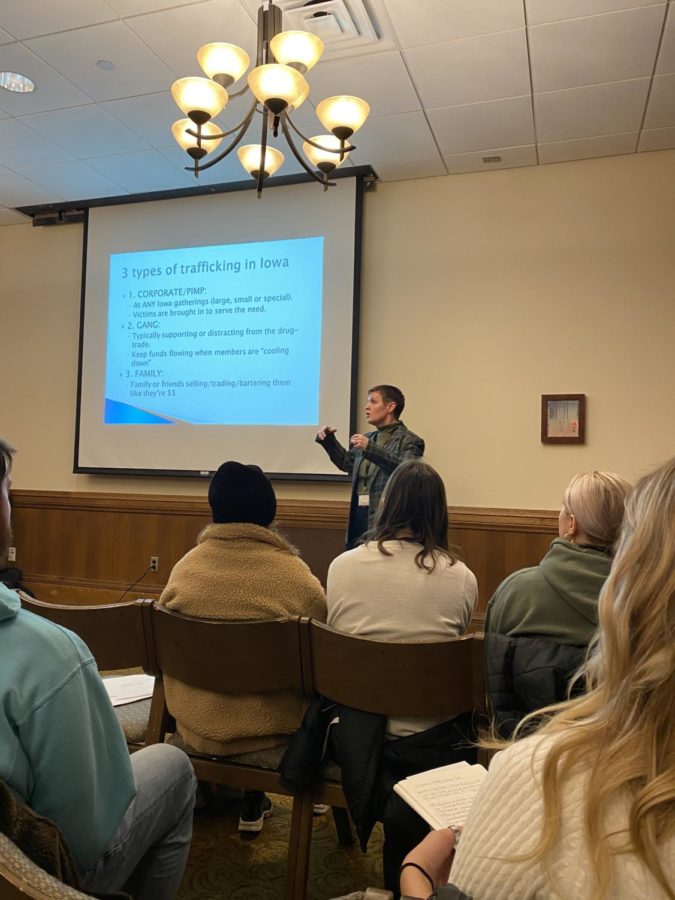Human trafficking session informs attendees of the dangers they face
Statewide coordinator, Ruth Buckles of Teens Against Human Trafficking for Youth and Shelter Services leads Thursday’s Human Trafficking Information Session.
January 30, 2020
Iowa State students learned the background of how human trafficking occurs in Iowa through an information session on Thursday.
A Human Trafficking Information Session hosted by the Iowa State Student Government took place in the Gold room at the Memorial Union. In attendance were students, faculty members and community members.
The presentation was led by Ruth Buckles, the statewide coordinator of Teens Against Human Trafficking for Youth and Shelter Services locally in Ames. Buckles labeled the three legal elements key to human trafficking as force, fraud and coercion.
In 2000 the Federal Victims Protection Act was passed to address the problem of trafficking persons, assist victims, prosecute offenders and educate/prevent human trafficking. Buckles said the three types of trafficking in Iowa include corporate/pimp, gang and family.
Family trafficking may begin with drugs and desperation or people in need of food, housing and basic needs and are typically smaller scaled. Corporate and pimp trafficking is when a head of a family is trafficking and they have their children placed as the runner of the organization trafficking the next line down.
“We have gangs in Iowa,” Buckles said. “We are at the crossroads of the United States, we’ve got two major interstates that go through here, we have cities, cheap real estate and we’re Iowa nice, we stay out of their business, we might gossip but we don’t interfere and we don’t get too close. Do you know how many ‘gangs’ are on the Iowa State campus? If you belong to a fraternity, sorority, a club there’s over 900 of those. You’re all in little mini gangs, families and so are they.”
It was not legally mandated to report human trafficking cases until July of 2015 in Iowa and the states lacks a child exploitation task force. Ages 0 to 80 are all at risk of being targeted by traffickers, especially female, foster youth and young unemployed adults, according to Buckles.
“A 14 year old girl went before the grand jury in Des Moines, Iowa, Polk County,” Buckles said. “She’s on the stand and they’re putting her trafficker away for 6 months is the recommendation because he was dealing drugs. He was drugging her. She turned to the judge and said ‘That’s it? That’s what your going to go after him for? That man has trafficked me since I was 6 years old he has bought and sold me at all of these places.’ She named eight places by name, drew pictures of them, drew the room she was raped on Saturdays and Sundays, because she had to go to school the rest of the days. Guy got out in 6 months, he’s out selling somebody else’s kid.”
To Increase personal safety Buckles suggested multiple tips.
Observe your surroundings and the safe options you can use if something happens. If you SEE something SAY something. If you HEAR something pay attention. If you FEEL uncomfortable watch and listen. Involved, connected, observant, protective people are the deterrent to traffickers, according to Buckles.
If someones feels they are at immediate risk or danger of human trafficking or witnesses some else immediately call 911.
To report the license plate/make/model of a suspicious vehicle contact the Iowa DMV Hotline at 1-800-700-1650.
The Iowa Domestic Violence & Victim Service Hotline is available at 1-800-770-1650 or by texting “Iowa Help” to 20121.
In the case of a minor call DHS Child Abuse Hotline at 1-800-362-2178.
The National Trafficking in Persons and Workers Task Force Complaint Line is available at 1-888-428-7581.
Trafficking Information and Referral Hotline is reachable via phone at 1-888-373-7888 or by texting “BEFREE” to 233733.
Make a report to the cyber tipline at report.cybertip.org if you witness any suspicious activity online.
For more information on trafficking or helping victims of trafficking online resources are available at www.polarisproject.org or at. www.missingkids.org.
Iowa State students can get more involved by taking part in Teens Against Human Traffiking (TAHT) or donating at yss.org.







